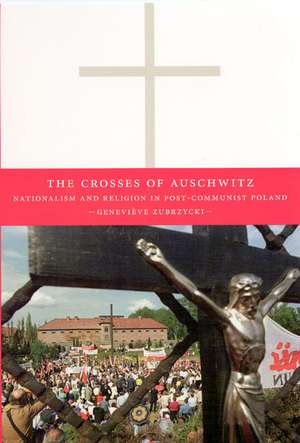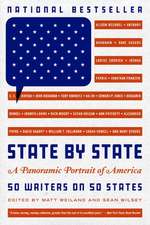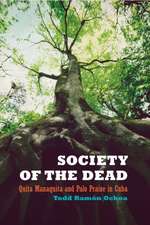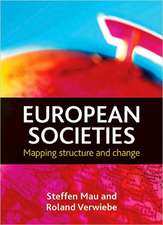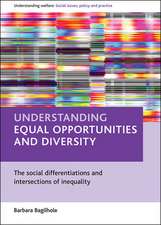The Crosses of Auschwitz: Nationalism and Religion in Post-Communist Poland
Autor Geneviève Zubrzyckien Limba Engleză Paperback – 21 sep 2006
In the summer and fall of 1998, ultranationalist Polish Catholics erected hundreds of crosses outside Auschwitz, setting off a fierce debate that pitted Catholics and Jews against one another. While this controversy had ramifications that extended well beyond Poland’s borders, Geneviève Zubrzycki sees it as a particularly crucial moment in the development of post-Communist Poland’s statehood and its changing relationship to Catholicism.
In The Crosses of Auschwitz, Zubrzycki skillfully demonstrates how this episode crystallized latent social conflicts regarding the significance of Catholicism in defining “Polishness” and the role of anti-Semitism in the construction of a new Polish identity. Since the fall of Communism, the binding that has held Polish identity and Catholicism together has begun to erode, creating unease among ultranationalists. Within their construction of Polish identity also exists pride in the Polish people’s long history of suffering. For the ultranationalists, then, the crosses at Auschwitz were not only symbols of their ethno-Catholic vision, but also an attempt to lay claim to what they perceived was a Jewish monopoly over martyrdom.
This gripping account of the emotional and aesthetic aspects of the scene of the crosses at Auschwitz offers profound insights into what Polishness is today and what it may become.
In The Crosses of Auschwitz, Zubrzycki skillfully demonstrates how this episode crystallized latent social conflicts regarding the significance of Catholicism in defining “Polishness” and the role of anti-Semitism in the construction of a new Polish identity. Since the fall of Communism, the binding that has held Polish identity and Catholicism together has begun to erode, creating unease among ultranationalists. Within their construction of Polish identity also exists pride in the Polish people’s long history of suffering. For the ultranationalists, then, the crosses at Auschwitz were not only symbols of their ethno-Catholic vision, but also an attempt to lay claim to what they perceived was a Jewish monopoly over martyrdom.
This gripping account of the emotional and aesthetic aspects of the scene of the crosses at Auschwitz offers profound insights into what Polishness is today and what it may become.
Preț: 300.41 lei
Nou
Puncte Express: 451
Preț estimativ în valută:
57.49€ • 62.43$ • 48.29£
57.49€ • 62.43$ • 48.29£
Carte tipărită la comandă
Livrare economică 23 aprilie-07 mai
Preluare comenzi: 021 569.72.76
Specificații
ISBN-13: 9780226993041
ISBN-10: 0226993043
Pagini: 280
Ilustrații: 39 halftones, 1 map, 5 tables
Dimensiuni: 152 x 229 x 23 mm
Greutate: 0.47 kg
Ediția:New ed.
Editura: University of Chicago Press
Colecția University of Chicago Press
ISBN-10: 0226993043
Pagini: 280
Ilustrații: 39 halftones, 1 map, 5 tables
Dimensiuni: 152 x 229 x 23 mm
Greutate: 0.47 kg
Ediția:New ed.
Editura: University of Chicago Press
Colecția University of Chicago Press
Notă biografică
Geneviève Zubrzycki is assistant professor of sociology at the University of Michigan.
Cuprins
List of Illustrations
Preface
Acknowledgments
Abbreviations
Key to Pronunciation
Introduction and Theoretical Orientations
1. Genealogy of Polish Nationalism
2. "We, the Polish Nation": Redefining the Nation in Post-Communist Poland
3. "Oswiecim"/"Auschwitz": Archaeology of a Contested Site and Symbol
4. The Aesthetics of the War of the Crosses: Mobilizing "the Nation"
5. Debating Poland by Debating the Cross
Conclusion: Nationalism and Religion Reexamined
Appendix A: Newspapers Consulted
Appendix B: Preamble to the Constitution of the Third Republic of Poland
Appendix C: Historical Cues
References
Index
Preface
Acknowledgments
Abbreviations
Key to Pronunciation
Introduction and Theoretical Orientations
1. Genealogy of Polish Nationalism
2. "We, the Polish Nation": Redefining the Nation in Post-Communist Poland
3. "Oswiecim"/"Auschwitz": Archaeology of a Contested Site and Symbol
4. The Aesthetics of the War of the Crosses: Mobilizing "the Nation"
5. Debating Poland by Debating the Cross
Conclusion: Nationalism and Religion Reexamined
Appendix A: Newspapers Consulted
Appendix B: Preamble to the Constitution of the Third Republic of Poland
Appendix C: Historical Cues
References
Index
Recenzii
“The study of nationalism is one of those fields that tend to produce more heat than light. Having sweated through many of the debates myself, I found this study of Polish nationalism since the collapse of Communism as calming and refreshing as a cool beer on an August day. Geneviève Zubrzycki’s writing is direct and unpretentious, her argument clear and convincing, and the material rich and original.”--Philip S. Gorski, Yale University
“By analyzing in detail the famous controversy over the crosses at Auschwitz, Zubrzycki’s book shows with great ingenuity how the meaning of ‘Polishness’ has been negotiated, debated, and fought over since the fall of state socialism. She demonstrates in convincing and authoritative fashion that this conflict was not only a dispute between Poles and Jews over the memory of Auschwitz, but also a debate among Poles about the ‘proper’ discursive establishment of Polish national identity. This will become the standard work on this extremely important topic.”--Jan Kubik, Rutgers University
“The Roman Catholic Church was one of the principal forces which made possible the ultimate success of the Poles in negotiating the end of the communist system and freeing themselves from Soviet domination. This balanced and well-researched book examines how this Church has reacted to the new and more complex problems posed by the achievement of freedom and independence, and in particular, the painful legacy of antisemitism in sections of Polish society and of the Church itself.”--Antony Polonsky, Brandeis University and the United States Holocaust Memorial Museum
"This is a brilliant book, both in terms of the author's insights and depth of understanding, and in terms of the coherence and logic of her presentation of her material."
"This work is grounded in the careful reading of sources, comprehensive study of literature, and careful empirical research conducted through participatory observation and personal interviews. The text is clearly structured and written with a light academic style. . . . An outstanding work of social science which is to be recommended to all students of Auschwitz, Poland, Christian-Jewish and Polish-Jewish relations, nationalism, and religion."
"[The] book teaches us how to practice event-focused historical and cultural sociology better than any methodological textbook could. . . . This book is not only for sociologists of religion or ethnicity, nor for the experts on Poland or Polish history, but for all who are bored with cross-tabulations and regression analysis and would like to see how qualitative methodology may be masterfully employed. Furrthermore, the book is fasicnating to read and hard to put away."
"The best book to date on the Auschwitz 'crosses controversy' . . . . The end result is a comprehensive study of religious symbolism and its impact on people's self-understanding as a national community. Hence the book is as relevant for sociologists of religion as it is for historians and religious-studies scholars."
"Zubrzycki's book will become an indispensable reading on the topic of nationalism and religion--among other reasons, it is one of the first books to identify the impasse in the contemporary scholarship on the problem."
"A brilliant study of how charged symbols and particular places can be implicated in the transformation of nation and religion."
"Zubrzycki's prose is both eloquent and clear, holding the reader's attention even through the most complex theoretical presentations and most detailed historical accounts. . . . This book has already become required reading for anyone interested in Poland or Roman Catholicism, and it should be part of any bibliography dealing with the relationship between religion, politics, and cultural identity."
